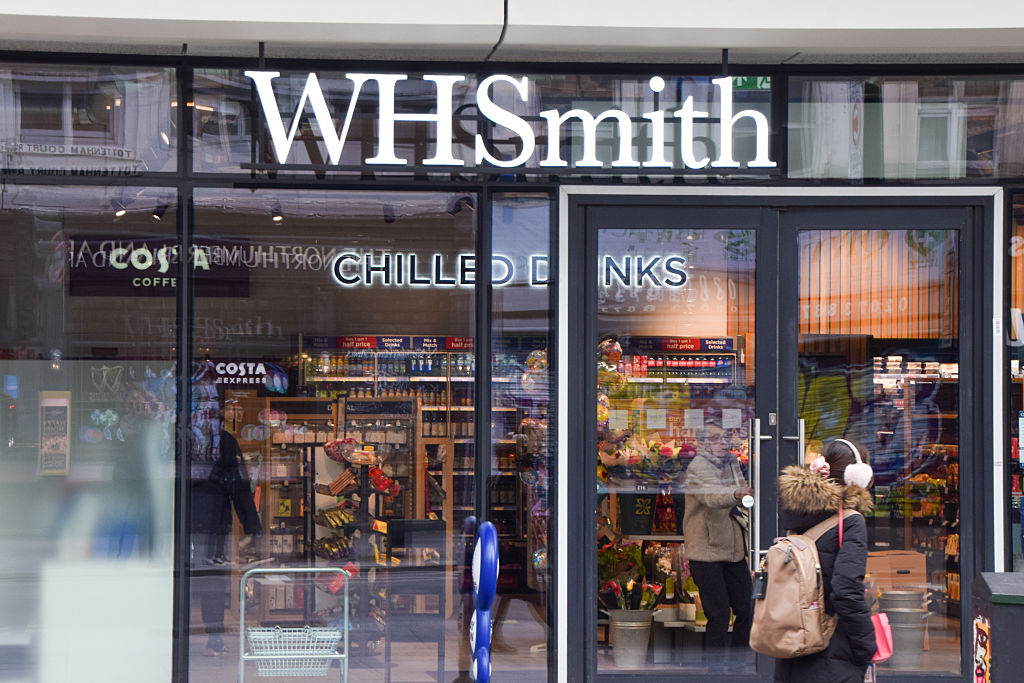Can a rebrand save WH Smith?
WH Smith's high-street shops have had their day and a change of owner is unlikely to turn things around, says Matthew Lynn


Get the latest financial news, insights and expert analysis from our award-winning MoneyWeek team, to help you understand what really matters when it comes to your finances.
You are now subscribed
Your newsletter sign-up was successful
Want to add more newsletters?

Twice daily
MoneyWeek
Get the latest financial news, insights and expert analysis from our award-winning MoneyWeek team, to help you understand what really matters when it comes to your finances.

Four times a week
Look After My Bills
Sign up to our free money-saving newsletter, filled with the latest news and expert advice to help you find the best tips and deals for managing your bills. Start saving today!
Some new carpets might have made a difference, or perhaps an updated stock range, some slicker-looking shops, and a fresh advertising campaign. Instead, the new owner of WH Smith, one of the oldest retailers on the British high street, have opted for one of the oldest tricks in the corporate playbook. It is changing the name. WH Smith will now be known as TG Jones. The trouble is that it’s hard to see that making much difference.
WH Smith is selling off its 480 high street shops to Modella Capital, a retail investment firm, for £76 million, and will focus purely on its travel unit, operating in airports and train stations around the world. That looks like a tacit admission that the only place to make money in Britain is from people getting out of the country – but it is hard to dispute the logic.
WH Smith plans to focus on what works
The travel business has been expanding rapidly, selling last-minute bottles of water, snacks and books in the departure lounge, while the high-street shops have been struggling to remain profitable. Without the albatross of the British high street, WH Smith will be free to focus on the healthy parts of the business and get rid of the often very tired stores in provincial and market towns selling an odd collection of books, stationery and snacks. With a share price that has fallen by 20% over the last year, it needed to do something.
MoneyWeek
Subscribe to MoneyWeek today and get your first six magazine issues absolutely FREE

Sign up to Money Morning
Don't miss the latest investment and personal finances news, market analysis, plus money-saving tips with our free twice-daily newsletter
Don't miss the latest investment and personal finances news, market analysis, plus money-saving tips with our free twice-daily newsletter
Still, it is hard to see how it makes any sense for the buyers, or for the shops that are left behind. The marketing consultants are probably feeling pleased with themselves for coming up with perhaps the only name that is as dull as “Smith”. But it’s hard to escape the feeling that the high-street business will fade away, joining the likes of Woolworths and Dixons as brands that have long since vanished from the major shopping centres.
There are three big problems. First, WH Smith was fading anyway. The over-50s might have nostalgic memories of when it was a gateway to the world on a provincial high street. It sold music, back when vinyl was still a thing, alongside a huge range of magazines and books. Before the internet, it was often the only place you could find out about what was happening elsewhere. Likewise, its stationery was where you picked out a new pencil case before school restarted for the year.
But sentiment aside, the market has moved on. Newspapers and magazines have been in steep decline. The book industry has been turned upside down by the Kindle. Plenty of people still buy physical books, but Waterstones has expanded, and has a far better offer than Smith’s does. People still need stationery, but there are plenty of places you can buy that. In many ways, it is surprising Smith’s is still around, given how much the market has changed over the last 20 years.
TG who?
Second, the brand change will confuse customers. Smith’s has endured despite the decline in its core market because it still has such a well-known brand. TG Jones, however, won’t have any brand at all. No one has ever heard of it, and, given that it does not sell a very exciting range of products, they won’t be very interested in finding out what it is there for.
Finally, it will distract management from improving the shops. It was always going to be tough for Smith’s to thrive when it faced so many challenges. However, competitors such as Waterstones, The Works and Card Factory have done far better in similar markets. The old management was far more interested in the travel unit and neglected the high-street shops. The new team will be devoted to establishing a completely different brand. It is hard to see that they will have the time or money for anything else. The legacy of the brand was about the only thing keeping the chain alive. The harsh truth is that TG Jones will struggle even more than WH Smith did – and it may not be around for very much longer.
This article was first published in MoneyWeek's magazine. Enjoy exclusive early access to news, opinion and analysis from our team of financial experts with a MoneyWeek subscription.
Get the latest financial news, insights and expert analysis from our award-winning MoneyWeek team, to help you understand what really matters when it comes to your finances.

Matthew Lynn is a columnist for Bloomberg and writes weekly commentary syndicated in papers such as the Daily Telegraph, Die Welt, the Sydney Morning Herald, the South China Morning Post and the Miami Herald. He is also an associate editor of Spectator Business, and a regular contributor to The Spectator. Before that, he worked for the business section of the Sunday Times for ten years.
-
 Average UK house price reaches £300,000 for first time, Halifax says
Average UK house price reaches £300,000 for first time, Halifax saysWhile the average house price has topped £300k, regional disparities still remain, Halifax finds.
-
 Barings Emerging Europe trust bounces back from Russia woes
Barings Emerging Europe trust bounces back from Russia woesBarings Emerging Europe trust has added the Middle East and Africa to its mandate, delivering a strong recovery, says Max King
-
 Barings Emerging Europe trust bounces back from Russia woes
Barings Emerging Europe trust bounces back from Russia woesBarings Emerging Europe trust has added the Middle East and Africa to its mandate, delivering a strong recovery, says Max King
-
 How a dovish Federal Reserve could affect you
How a dovish Federal Reserve could affect youTrump’s pick for the US Federal Reserve is not so much of a yes-man as his rival, but interest rates will still come down quickly, says Cris Sholto Heaton
-
 Three companies with deep economic moats to buy now
Three companies with deep economic moats to buy nowOpinion An economic moat can underpin a company's future returns. Here, Imran Sattar, portfolio manager at Edinburgh Investment Trust, selects three stocks to buy now
-
 Should you sell your Affirm stock?
Should you sell your Affirm stock?Affirm, a buy-now-pay-later lender, is vulnerable to a downturn. Investors are losing their enthusiasm, says Matthew Partridge
-
 Why it might be time to switch your pension strategy
Why it might be time to switch your pension strategyYour pension strategy may need tweaking – with many pension experts now arguing that 75 should be the pivotal age in your retirement planning.
-
 Beeks – building the infrastructure behind global markets
Beeks – building the infrastructure behind global marketsBeeks Financial Cloud has carved out a lucrative global niche in financial plumbing with smart strategies, says Jamie Ward
-
 Saba Capital: the hedge fund doing wonders for shareholder democracy
Saba Capital: the hedge fund doing wonders for shareholder democracyActivist hedge fund Saba Capital isn’t popular, but it has ignited a new age of shareholder engagement, says Rupert Hargreaves
-
 Silver has seen a record streak – will it continue?
Silver has seen a record streak – will it continue?Opinion The outlook for silver remains bullish despite recent huge price rises, says ByteTree’s Charlie Morris